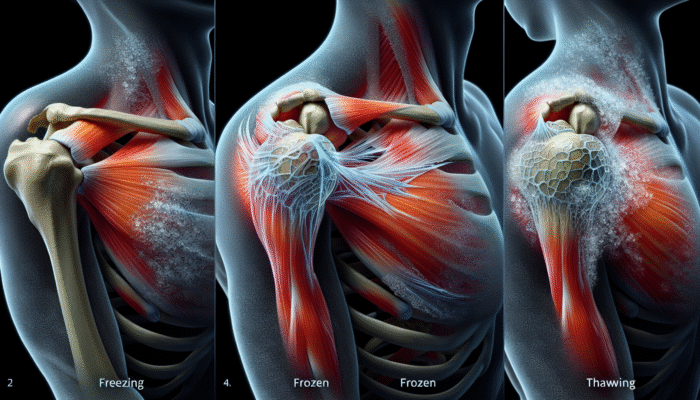Gain In-Depth Insights into Frozen Shoulder: Understanding Adhesive Capsulitis
In-Depth Analysis of Frozen Shoulder: Key Insights into Adhesive Capsulitis

Frozen shoulder, clinically known as adhesive capsulitis, is a complex and painful condition that leads to considerable stiffness and discomfort in the shoulder joint. This condition can severely limit the range of motion and often progresses through three well-defined stages: the freezing phase, characterised by intense pain and increasing restrictions in shoulder mobility; the frozen phase, where pain may diminish but stiffness persists; and the thawing phase, during which mobility gradually improves. As a result, individuals with frozen shoulder face significant challenges in executing everyday activities, such as reaching for items or lifting objects overhead. This highlights the necessity for a comprehensive understanding of this condition to ensure effective management and treatment strategies.
Research indicates that frozen shoulder affects approximately 2-5% of the population in the UK, predominantly impacting individuals aged between 40 and 60 years. Recognising the signs and symptoms associated with this condition is essential, as early intervention can considerably speed up recovery. Ignoring initial symptoms may lead to prolonged discomfort and further limitations in shoulder movement. Therefore, having a thorough understanding of frozen shoulder is crucial for both patients and healthcare providers, equipping them to implement timely and effective treatment plans that can significantly improve patient outcomes.
Recognising Symptoms and Achieving Accurate Diagnosis of Frozen Shoulder
Individuals suffering from frozen shoulder typically endure a spectrum of symptoms, including persistent shoulder pain that may radiate down the arm, accompanied by significant stiffness that greatly restricts movement. These symptoms often intensify at night, disrupting sleep patterns and exacerbating overall discomfort. An accurate diagnosis of this condition generally involves a detailed physical examination, during which a healthcare professional assesses the range of motion and may provoke pain responses through specific movements to confirm the diagnosis.
In specific cases, imaging tests such as X-rays or MRIs may be utilised to exclude other possible causes of shoulder pain, such as rotator cuff tears or arthritis. Nevertheless, the distinctive pattern of stiffness and pain associated with frozen shoulder sets it apart from other shoulder-related conditions. Understanding these diagnostic criteria is crucial for optimising treatment options, including exploring therapies like acupuncture for frozen shoulder, which may offer substantial relief to many patients affected by this condition.
Examining Causes and Identifying Significant Risk Factors for Frozen Shoulder
The exact cause of frozen shoulder is still not entirely understood; however, it is often observed following a period of immobility, such as after surgery or injury. This lack of movement can lead to thickening of the shoulder capsule, resulting in restricted motion. Several risk factors increase the likelihood of developing this condition, with certain health issues notably heightening susceptibility. For example, individuals with diabetes are approximately three times more likely to develop frozen shoulder, likely due to changes in connective tissue that impair mobility.
Other relevant risk factors include thyroid diseases, prior shoulder injuries, and various cardiovascular conditions. Additionally, statistical data reveals that women are more prone to experience this condition compared to men. By recognising these risk factors, healthcare professionals can identify high-risk individuals and implement early intervention strategies, which may include considering acupuncture for frozen shoulder as a crucial aspect of a comprehensive treatment plan aimed at alleviating symptoms and restoring mobility.
The Impact of Acupuncture on Health Recovery: An In-Depth Overview

Understanding Acupuncture: Revealing an Ancient Healing Method
Acupuncture is a time-honoured practice rooted in traditional Chinese medicine, with a rich history spanning thousands of years. This therapeutic technique involves the precise insertion of ultra-fine needles into specific points on the body, known as acupuncture points, to stimulate healing and alleviate pain. The underlying philosophy asserts that energy, often referred to as ‘Qi’, flows through the body along designated meridians. Stimulating these points aims to restore balance and enhance the body’s inherent healing processes, embracing a holistic view of health and wellness.
In the UK, acupuncture has gained significant acceptance as a complementary treatment within conventional healthcare systems. Numerous practitioners integrate acupuncture into holistic treatment plans, particularly for those battling chronic pain conditions. The appeal of acupuncture lies in its non-invasive nature and minimal side effects, making it an attractive alternative for individuals seeking relief from ailments such as frozen shoulder, without the reliance on pharmaceutical solutions that may pose adverse effects.
Understanding the Mechanisms of Acupuncture: How It Works
The effectiveness of acupuncture is supported by its complex mechanisms, addressing both physical discomfort and emotional well-being. When needles are skillfully inserted into acupuncture points, they stimulate the nervous system, triggering the release of endorphins, which are the body’s natural pain-relieving substances. This biochemical response not only alleviates pain but also promotes relaxation, effectively mitigating the anxiety often associated with chronic conditions like frozen shoulder.
Additionally, acupuncture enhances blood flow to the affected area, facilitating the delivery of vital nutrients and oxygen while aiding in the removal of waste products. This improved circulation is essential for reducing inflammation and promoting healing. In the context of shoulder pain, these physiological reactions play a significant role in the effectiveness of acupuncture for frozen shoulder, providing a pathway for patients to regain mobility and relieve the discomfort associated with this challenging condition.
Discovering the Extensive Benefits of Acupuncture
The benefits of acupuncture extend far beyond mere pain relief. Research has demonstrated that acupuncture can lead to considerable improvements in mobility and overall function for individuals suffering from frozen shoulder. Notably, it can significantly reduce stiffness, enabling patients to engage in daily activities with much greater ease and comfort.
Moreover, acupuncture is associated with a relatively low occurrence of side effects compared to conventional medications, which may entail various complications. This aspect renders acupuncture an appealing choice for those seeking natural remedies for pain management. Furthermore, many patients report an overall enhancement in well-being after treatment, experiencing improved sleep quality and reduced stress levels, all contributing to a higher quality of life and overall health.
When managing shoulder pain, incorporating acupuncture into a broader treatment strategy often yields favourable outcomes. Observational evidence suggests that patients who combine acupuncture with physiotherapy or chiropractic care frequently experience enhanced benefits, leading to expedited recovery and longer-lasting results. Hence, integrating acupuncture for frozen shoulder emerges as a compelling option for individuals confronting this debilitating condition.
Utilising Acupuncture for Shoulder Pain: A Personalised Approach
Focusing on Shoulder Pain: The Precision and Art of Acupuncture Techniques
Acupuncture specifically targets shoulder pain by concentrating on key acupuncture points located around the shoulder and along associated meridians. Practitioners create tailored treatment plans designed to address the unique needs of each patient, selecting points that correspond to the intensity and nature of the pain experienced. For example, points like LI15 (Jianyu) and SI9 (Jianzhen) are often employed to directly relieve shoulder discomfort. Conversely, points along the liver and kidney meridians may be used to address underlying tensions contributing to the pain.
This targeted approach not only alleviates discomfort but also improves overall shoulder functionality and mobility. Many patients report noticeable enhancements in their range of motion and a decrease in stiffness after just a few treatment sessions. Consistent acupuncture treatments can lead to ongoing improvements, enabling individuals to gradually restore full shoulder functionality. This precision-oriented methodology positions acupuncture for frozen shoulder as a critical component of therapeutic regimens aimed at effectively restoring mobility and alleviating discomfort.
Integrating Acupuncture with Other Therapeutic Approaches
The effectiveness of acupuncture can be significantly enhanced when combined with other treatment modalities. For instance, physiotherapy complements acupuncture by offering targeted exercises designed to enhance shoulder mobility and strength. Practitioners typically advocate for a concurrent approach, scheduling acupuncture sessions alongside physiotherapy appointments. This synergistic relationship facilitates pain relief through acupuncture while physiotherapy focuses on retraining and reinforcing the shoulder muscles, providing a holistic treatment strategy.
Additionally, medications may be prescribed to manage acute pain during the treatment process. Non-steroidal anti-inflammatory drugs (NSAIDs) can assist in controlling inflammation, thereby making acupuncture more effective in alleviating pain and enhancing the range of motion. By integrating acupuncture for frozen shoulder with physiotherapy and medication, patients often experience a more comprehensive recovery strategy that yields remarkable results and significant improvements in their quality of life.
Success Stories and Case Studies: Highlighting the Effectiveness of Acupuncture
A wealth of case studies demonstrates the efficacy of acupuncture in treating frozen shoulder. For instance, a study published in a reputable medical journal examined a cohort of patients who underwent a series of acupuncture treatments over an eight-week period. The findings revealed a significant reduction in pain levels and a marked enhancement in shoulder mobility, reinforcing the viability of acupuncture as a primary treatment option for individuals afflicted with this condition.
One particularly inspiring success story featured a patient who had struggled with frozen shoulder for over a year. After receiving regular acupuncture sessions, they reported a significant decrease in pain and a return to normal daily activities, including the ability to play tennis—an activity they feared they would have to abandon forever. Such testimonials highlight the transformative potential of acupuncture for frozen shoulder, offering renewed hope to individuals facing this challenging condition.
Choosing a Skilled Acupuncturist in the UK: Important Factors to Consider
Essential Qualifications and Certifications: Ensuring Safe and Effective Acupuncture Treatment
When seeking acupuncture treatment in the UK, it is crucial to select a qualified practitioner. Look for acupuncturists who are registered with the British Acupuncture Council (BAcC), as this affiliation ensures compliance with rigorous training and practice standards. Registered acupuncturists typically complete an accredited training programme that includes comprehensive studies in anatomy, physiology, and the principles of acupuncture.
Moreover, the BAcC establishes a framework for professional conduct and ethics, providing patients with confidence when selecting their practitioner. This level of professionalism is vital, ensuring that the acupuncturist is well-prepared to safely administer treatments for conditions like frozen shoulder. By prioritising qualifications, patients can enhance their healing experience and improve the likelihood of successful outcomes with acupuncture for frozen shoulder.
What to Anticipate During Your Acupuncture Session?
A typical acupuncture session lasts between 30 and 60 minutes, commencing with a detailed consultation. During this initial meeting, the acupuncturist will evaluate your medical history, current health concerns, and specific issues related to your shoulder pain. Following this assessment, needle insertion will occur, using fine needles specifically designed to minimise discomfort.
Most patients report experiencing only mild sensations during the procedure, such as a slight prick or a tingling feeling. The acupuncturist may leave the needles in place for around 20 to 30 minutes, allowing for optimal stimulation of the acupuncture points. Many individuals find this experience to be relaxing, with some even dozing off during the session. Knowing what to expect can help alleviate anxiety for first-time patients, making the journey towards recovery with acupuncture for frozen shoulder a more comfortable and reassuring experience.
Financial Considerations and Insurance Coverage for Acupuncture Treatments
In the UK, the cost of acupuncture sessions typically ranges from £40 to £70 per session, with variations attributed to the practitioner’s location and expertise. While acupuncture is widely recognised as a beneficial therapeutic intervention, patients must consider the financial implications when seeking treatment for frozen shoulder.
Many private health insurance plans offer coverage for acupuncture, making it a viable option for individuals looking for relief from shoulder pain. Patients are encouraged to consult with their insurance providers to determine specific coverage details and conditions. Investing in acupuncture can yield significant returns in terms of pain relief and improved mobility, making it a worthwhile consideration for those suffering from frozen shoulder.
Finding an Acupuncturist in Your Local Area: Useful Resources
Locating a registered acupuncturist nearby is made simpler through online directories and the British Acupuncture Council’s website. These resources facilitate the search for practitioners based on your geographical location, ensuring that you connect with qualified professionals who adhere to high standards of practice.
As you search, consider reading reviews from previous patients to assess the acupuncturist’s effectiveness and approach. Establishing a rapport with your practitioner is essential, as a positive therapeutic relationship can enhance the overall experience and outcomes of treatment. With numerous practitioners available throughout the UK, finding the right acupuncturist to address your needs and explore acupuncture for frozen shoulder is entirely achievable.
Acupuncture Techniques for Effective Management of Frozen Shoulder
Strategic Needle Placement: Maximising Treatment Effectiveness
The precise placement of needles is a vital aspect of acupuncture, particularly when addressing frozen shoulder. Acupuncturists employ a technique known as ‘point selection’ to identify the most effective acupuncture points for alleviating pain and stiffness. Commonly targeted points include those located around the shoulder joint, such as GB21 (Jianjing) and LI15 (Jianyu).
Additionally, acupuncturists may stimulate points along the meridians associated with the shoulder, including the lung and heart meridians, to enhance the overall effectiveness of the treatment. The strategic placement of needles aims to promote circulation, reduce inflammation, and relieve muscle tension in the shoulder region. This targeted approach is fundamental to the success of acupuncture for frozen shoulder, facilitating a quicker and more sustained recovery for patients.
Guidelines for Treatment Frequency and Duration for Optimal Results
The frequency and duration of acupuncture treatment largely depend on the severity of the frozen shoulder and the individual’s response to therapy. Typically, practitioners recommend weekly sessions over a period of 6 to 8 weeks to achieve optimal results. This treatment plan allows sufficient time for the body to respond positively while also enabling the acupuncturist to monitor progress and make necessary adjustments.
As treatment progresses, the acupuncturist may evaluate the patient’s response and modify the frequency of sessions as necessary. Some individuals may experience relief within just a few treatments, while others might require a more extended course of therapy. This personalised approach ensures that each patient receives the most effective care possible, maximising the benefits of acupuncture for frozen shoulder and facilitating a return to pain-free movement.
Complementary Techniques to Enhance Acupuncture Treatment Efficacy
To amplify the therapeutic benefits of acupuncture, practitioners may incorporate complementary techniques such as electroacupuncture and cupping. Electroacupuncture involves applying a mild electrical current to the needles, significantly enhancing the stimulation of the acupuncture points. This method can provide deeper muscle relaxation and more pronounced pain relief, making it particularly advantageous for patients experiencing severe symptoms.
Cupping therapy, another adjunctive treatment, utilises suction cups placed on the skin to increase blood flow and alleviate muscle tension. The combination of these therapies can significantly enhance the overall effectiveness of acupuncture for frozen shoulder, allowing patients to achieve substantial improvements in pain management and functional mobility.
Expected Results and Benefits of Acupuncture Treatment for Frozen Shoulder
Patients undergoing acupuncture treatment for frozen shoulder can expect a variety of positive outcomes and benefits. Many individuals report substantial reductions in pain levels and significant increases in their range of motion following a series of treatment sessions. These improvements can dramatically facilitate daily activities, from simple tasks like reaching for objects to more complex movements involved in sports or exercise.
The long-term benefits of acupuncture extend beyond immediate pain relief, encompassing the potential prevention of future shoulder-related problems. Regular maintenance sessions can help sustain mobility and prevent recurrences of frozen shoulder. Embracing acupuncture for frozen shoulder not only aids recovery but also empowers individuals to take charge of their health and overall well-being, fostering a proactive approach to their physical health.
Patient Experiences and Transformative Testimonials of Acupuncture for Frozen Shoulder
Inspiring Personal Stories of Recovery Through Acupuncture
Personal testimonials from individuals who have received acupuncture for frozen shoulder often highlight its transformative effects. Many patients recount their heartfelt experiences of relief from debilitating pain and the joy of regaining the ability to participate in activities they once cherished, such as gardening or spending quality time with family.
One particularly uplifting account featured a middle-aged woman who had endured frozen shoulder for over a year. After several acupuncture sessions, she reported a dramatic decrease in pain and newfound capabilities to perform daily tasks without discomfort. Such narratives serve as powerful reminders of the healing potential of acupuncture, providing hope to others facing similar challenges with shoulder pain.
Long-Term Advantages Beyond Immediate Pain Relief: A Holistic Perspective
The long-term benefits of acupuncture extend well beyond immediate pain relief. Numerous patients discover that regular acupuncture treatments not only help maintain shoulder mobility but also enhance overall physical health and emotional well-being. Through consistent care, individuals can effectively prevent the recurrence of frozen shoulder or other musculoskeletal issues, leading to a sustainable and improved quality of life.
Patients frequently report improved sleep quality, reduced stress, and an enhanced sense of relaxation following acupuncture treatment. These holistic benefits contribute to an overall sense of empowerment, enabling individuals to actively engage in their health journey. Embracing acupuncture for frozen shoulder evolves from being merely a treatment option to becoming a lifestyle that promotes enduring wellness and vitality.
Frequently Asked Questions: Addressing Common Concerns About Acupuncture and Frozen Shoulder
What is frozen shoulder?
Frozen shoulder, also known as adhesive capsulitis, is a condition marked by significant stiffness and pain in the shoulder joint, severely limiting movement and daily activities.
How can acupuncture assist with frozen shoulder?
Acupuncture alleviates pain and enhances mobility by stimulating nerves, resulting in the release of endorphins, improved blood flow, and reduced inflammation in the affected area.
How many acupuncture sessions are typically needed for effective treatment?
Generally, patients undergo weekly sessions for a duration of 6 to 8 weeks, although the frequency may vary based on individual progress and response to treatment.
What should I expect during an acupuncture session?
Expect a consultation followed by the insertion of fine needles, with treatment lasting between 30 and 60 minutes. Most patients report experiencing only minimal discomfort during the procedure.
Is acupuncture considered a safe treatment option?
When performed by a qualified practitioner, acupuncture is regarded as safe. Side effects are rare but may include minor bruising or soreness at the needle insertion sites.
Can acupuncture be effectively combined with other treatment options?
Yes, acupuncture can be successfully integrated with physiotherapy and medication to enhance recovery outcomes from frozen shoulder.
What is the typical cost of acupuncture in the UK?
In the UK, acupuncture sessions usually range from £40 to £70, with costs varying based on the practitioner’s experience and geographical location.
Will my insurance cover acupuncture treatments?
Some private health insurance plans offer coverage for acupuncture treatments. It is advisable to consult with your provider for specific coverage details and conditions.
How can I find a qualified acupuncturist near me?
You can locate registered acupuncturists through the British Acupuncture Council’s website or online directories, ensuring they adhere to professional standards of practice.
What are the long-term benefits of acupuncture for frozen shoulder?
Long-term benefits may include sustained pain relief, improved mobility, and the prevention of future shoulder issues through regular maintenance treatments.
Connect with us on Facebook!
The Article: Acupuncture for Frozen Shoulder: Effective Relief Techniques appeared first on https://mcrtherapies.co.uk
The Article Acupuncture Techniques for Effective Frozen Shoulder Relief Was Found On https://limitsofstrategy.com
References:
Acupuncture for Effective Relief of Frozen Shoulder Techniques


